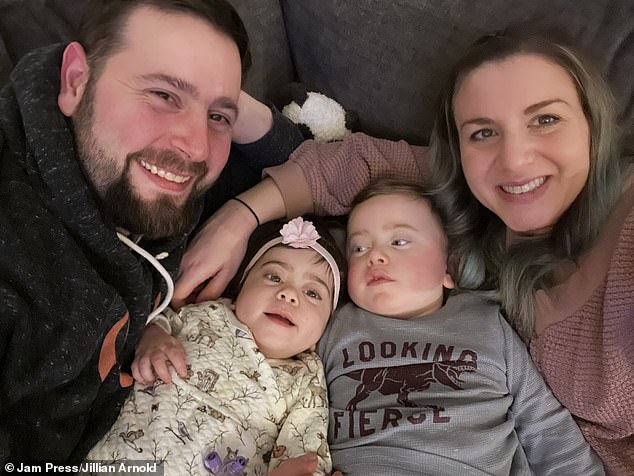An Ohio couple is facing the devastating news that their two young children have a rare disorder called “baby Alzheimer’s.”
Stella and Roman Arnold, ages four and five, respectively, have a rare genetic condition that causes worsening neurological decline in children similar to that experienced by adult Alzheimer’s patients.
However, Stella and Roman are defying the odds, as they have been given a life expectancy of about three years. But her mother, Jillian Arnold, is already mourning her baby in anticipation of her heartbreaking loss.
She said: “It’s a very strange feeling to mourn a child that you still hold in your arms. I try not to ignore those feelings when they arise, but I also try not to dwell on them.”
Stella (center left) and Roman Arnold (center right) have a rare genetic condition that causes progressive neurological deterioration similar to Alzheimer’s disease in adults. They are pictured with their parents Donald (far left) and Jillian (far right).
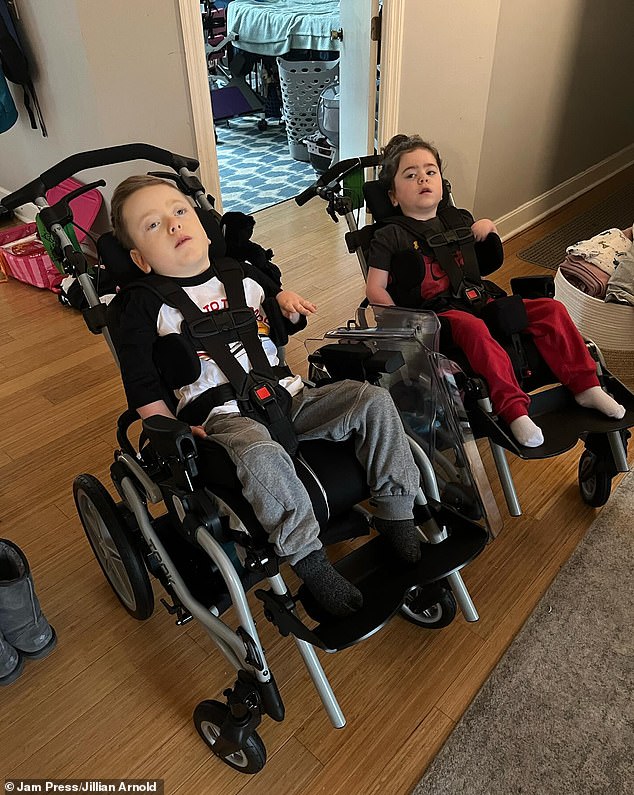
Stella and Roman are defying the odds as they have been given a life expectancy of just three years.
Mrs Arnold added: “This disease is cruel in the fact that you can ‘get a taste’ of who your children really are – and deep down, who they still are – and then it quickly takes it all away.
“It’s something I wouldn’t wish on my worst enemy.”
Roman was diagnosed at six months old with the severe form of acid sphingomyelinase deficiency type A (ASMD).
This genetic condition causes children to experience loss of motor skills, intellectual disability, feeding difficulties, jaundice (skin cracking), and an enlarged liver and spleen.
It is characterized by a deficiency of an enzyme called sphingomyelinase. This enzyme is needed to break down a fatty substance called sphingomyelin, a crucial part of cells.
It is a critical component of cell membranes that insulate nerves and plays an important role in cell communication and cell death.
When those cells do not die as planned, they accumulate in various tissues of the body and affect key organs, including the liver, spleen, brain and spine.
ASMD is a genetic condition and occurs when a child inherits two non-functioning genes from their parents: one from the mother and one from the father.
There is no cure. Instead, doctors treat the symptoms that occur as a result of having the disease.
The typical life expectancy of patients with ASMD type A is two to three years, and about a quarter of patients die from some type of neurodegenerative disease.
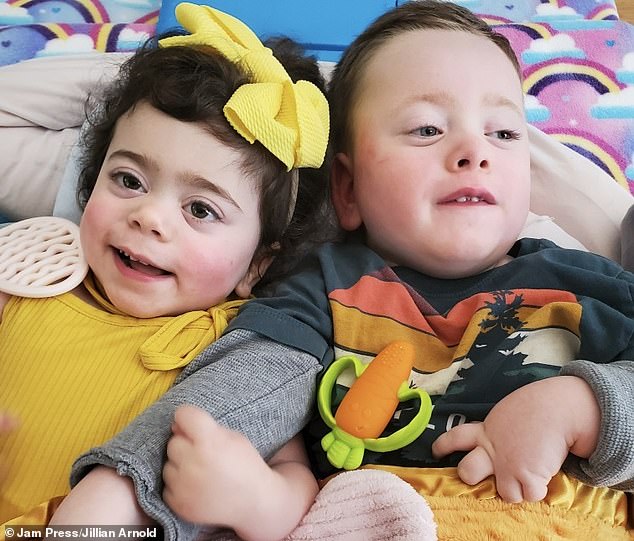
Roman (right) was diagnosed at six months with the severe form of acid sphingomyelinase deficiency type A (ASMD).
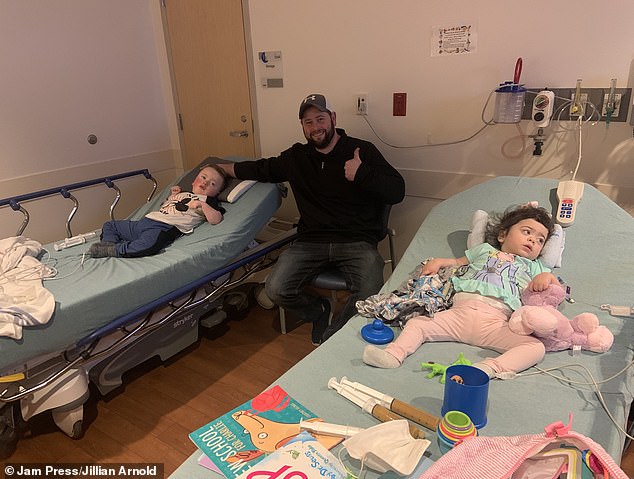
The Arnolds have already begun to mourn the loss of their young children, they said.
Roman was behind in his achievements, such as rolling over, which was the first sign to his parents that something was wrong.
Then he started vomiting most of his feedings. A physical examination revealed that she had an enlarged liver and spleen.
Doctors diagnosed him with ASMD, also known as Niemann-Pick disease (NPD), after a series of tests and confirmed it was the more severe type A. 0.4 to 0.6 per 100,000 births in the world.
Human Resources and Services Administration Dear All Only about 15 babies are born with ASMD in the U.S. each year.
And if parents already have a child with ASMD, they have a one in four chance of having another child with the disease.
Mrs Arnold said: “I felt like it couldn’t be real and I couldn’t understand why this was happening to us.”
“The most difficult aspect of this disease is watching once healthy and vibrant children begin to become a shadow of who they once were.”
Just days before her son’s diagnosis, Jillian found out she was pregnant again. But the news was bittersweet.
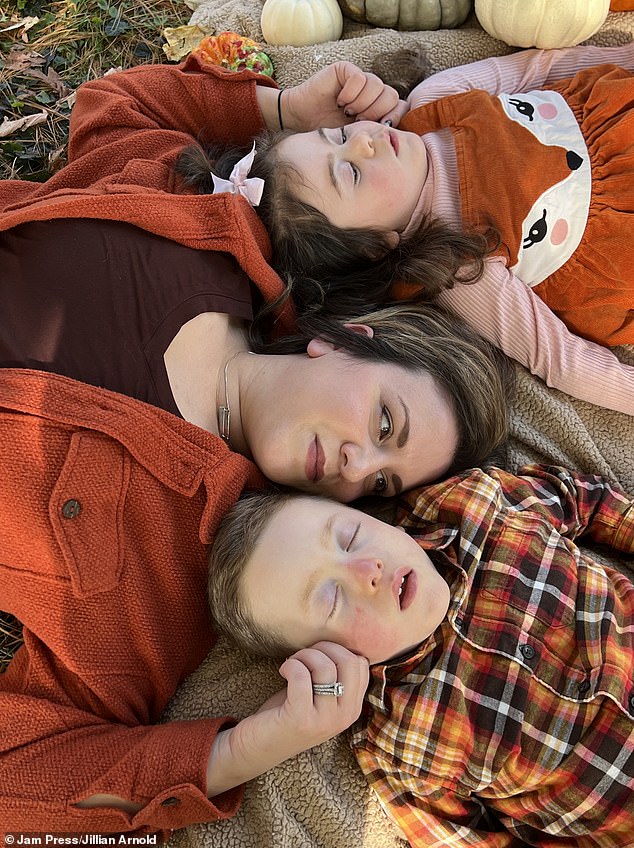
Mrs. Arnold said watching her children go through this has tested her marriage, her faith and her mental health.
A doctor informed her that, given her own genetic predisposition to the disease, as well as that of her husband, her unborn daughter had a 25 percent chance of contracting it.
When she was born, Stella was “fiery, driven, strong and feisty.”
Mrs Arnold said: “We were very hopeful that she wouldn’t have it because she seemed much stronger physically than Roman did when he was a baby. She also didn’t have any of the vomiting problems that he had.
“We received his diagnosis when he was about three months old and our hearts were broken for the second time.”
Stella was also diagnosed with the most severe form of the disease, type A.
He said the ordeal has tested both his marriage and his faith.
Roman and Stella are now involved in a clinical trial of a treatment candidate that has extended their survival by a couple of years, which Ms. Arnold considers “a huge victory.”
She and her husband have begun sharing their story online and on podcasts to help guide other parents, which has brought them some comfort.
While they will never be happy with their children’s diagnosis, they have accepted it.
Mrs Arnold said: ‘It has tested my mental health, my patience and my hope. But here we are, all still standing and enjoying our lives.
“I know there is a cure.”


